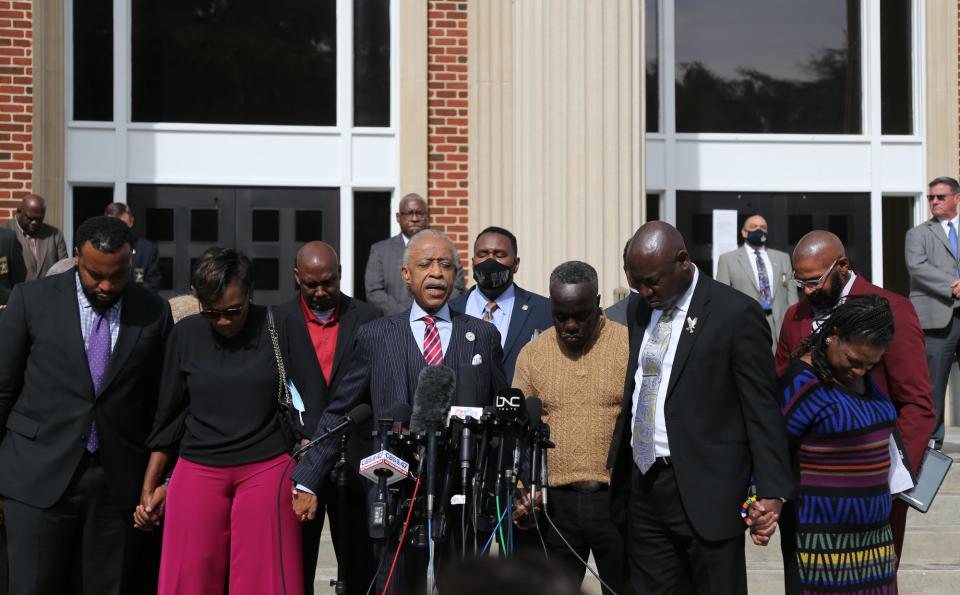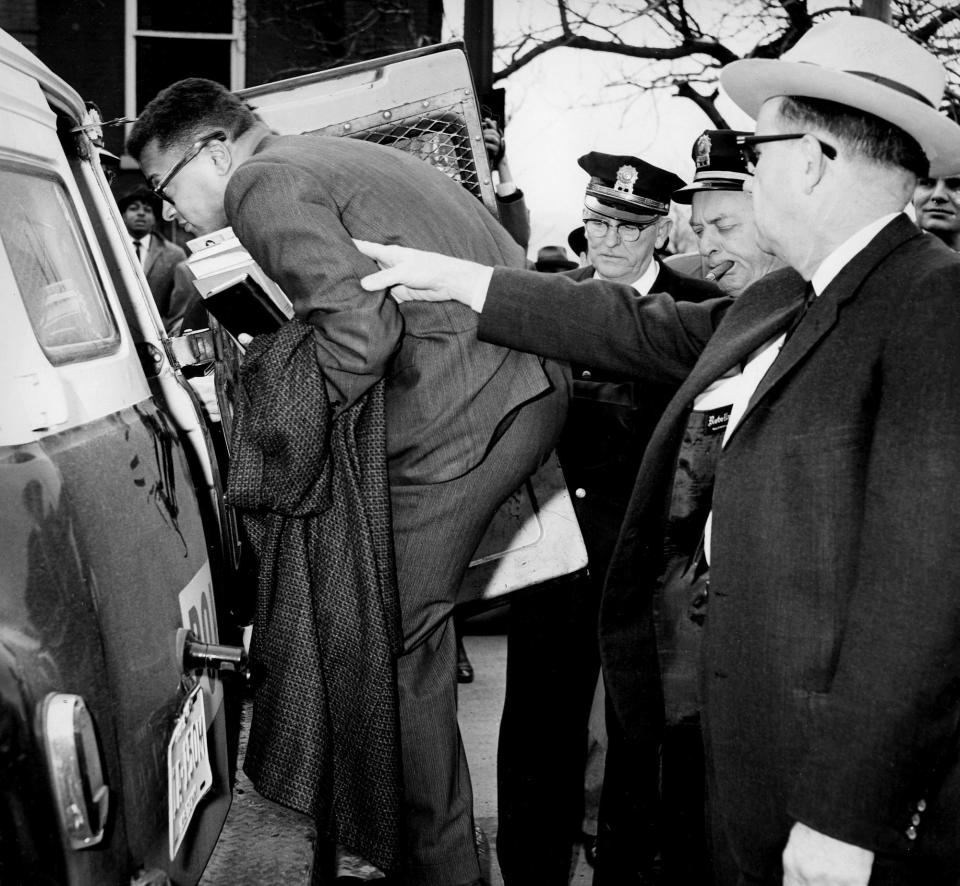Black pastors: Ahmaud Arbery case highlights historical community role
Minutes after three men in Brunswick, Georgia, were found guilty of killing jogger Ahmaud Arbery, the Rev. Al Sharpton led a large crowd gathered outside the Glynn County Courthouse in prayer. People closed their eyes and bowed their heads in unison when Sharpton said, "Let us pray."
That quiet moment outside the courthouse, a day before Thanksgiving, came two weeks after hundreds of Black faith leaders from across the country rallied there to support Arbery's family in defiance of defense attorney Kevin Gough, who represented one of the men on trial in Arbery's shooting death in February 2020. Gough, reacting to Sharpton sitting in court with Arbery's family, had told Judge Timothy Walmsley in early November that he didn't want "any more Black pastors" in the courtroom lest they intimidate the jury.
"His statement pushed me to go support and be there," said Bishop Jamie Johnson, who drove 3½ hours through Georgia from Macon to Brunswick last month.
From slavery through the civil rights movement, Black pastors and religious leaders have always been the Black community's voice. In recent years, they have come to the forefront amid a wave of outrage and concerns about police brutality and racial inequality.
Opinion: Ahmaud Arbery was murdered or, more accurately, lynched
After the Arbery verdicts: A cheering father, a 'floored' defense attorney, a chanting crowd
"We are compelled to be on the front lines of what's going on in our community," said Johnson, of James Temple Miracle Center. "All the way up from slavery up until Jim Crow and the civil rights movement, pastors have been the ones to point out injustices, point out racism and stand up for the people we serve."

The Rev. William J. Barber II, a pastor and activist who also showed up at the courthouse, said it would be a form of "pastoral malpractice" not to be vocal and present in times of trouble.
"I'm a pastor, and there's no separation between my pastoral responsibilities and my responsibility to challenge the systems in society that hurt the people I pastor," said Barber, who co-chairs the new anti-poverty organization Poor People's Campaign.
Inciting rebellion
Before enslaved African Americans were free, Black preachers were instrumental in fighting slavery.
"Black preachers became the center of how Black people began to articulate what freedom was," said Rickey Hill, an emeritus professor of political science at Jackson State University in Jackson, Mississippi. "They found words in the Bible to prove to slaves that what their masters were doing to them was immoral. Look at the story of slave revolts, and you would find that the leaders who led these slave revolts were preachers."
One of the bloodiest slave revolts in American history occurred in 1831 when Nat Turner, an enslaved preacher, led roughly 80 enslaved people in an uprising that killed more than 50 white people. In Charleston, South Carolina, a fiery preacher named Denmark Vesey in the African Methodist Episcopal Church plotted an unsuccessful slave revolt with other leaders from his church. Inspired by Vesey, a network of enslaved and free Black people planned to seize Charleston's arsenal and kill slaveholders throughout the city. Charleston officials, however, learned of the insurrection before it happened. Vesey was captured and executed.
Fearful that Black preachers could incite revolts, many Southern states responded with legislative crackdowns.
In 1848, Georgia passed a slave code banning Black people from partaking in religious services.
"No person of color, whether free or slave, shall be allowed to preach to, exhort, or join in any religious exercise with any persons of color, either free or slave," the law said.
In January 1865, with the Confederacy on its heels and the Civil War coming to a close, Union Gen. William Tecumseh Sherman met with 20 Black ministers in Savannah, Georgia.
Speaking on behalf of the thousands of enslaved people who were set to be free, the ministers wanted to help them survive in a new world.
Their solution was "40 acres and a mule."
Sherman issued a special order to confiscate Confederate land to ensure that each Black family had a "plot of not more than forty acres of tillable ground." Though the assassination of President Abraham Lincoln in April 1965 put a stop to the program, the Black ministers had persuaded the Union into a first attempt at reparations for slavery.
Politics and preachers
Equipped with unprecedented freedom after the Civil War, Black pastors emerged as spiritual leaders and politicians.
"During Reconstruction, it became very common to have Black clergy in political offices, whether it was Congress or at the local level," said Eric McDaniel, a political scientist at the University of Texas. This new political empowerment helped expand the role of Black pastors because they could now campaign for equality from the pulpit and congressional chambers, he said.
The first African American to serve in the U.S. Congress was a preacher. Sen. Hiram Rhodes Revels, an ordained minister who was on the Education and Labor Committee from 1869 to 1871, used the podium and the pulpit to fight for the advancement of African Americans, specifically the education of former slaves.
"The colored race can be built up and assisted … in acquiring property, in becoming intelligent, valuable, useful citizens, without one hair upon the head of any white man being harmed," Revels said.
By the early 20th century, W.E.B. DuBois had outlined the nuanced role of the Black preacher when he described them as a "leader, politician, orator, boss and idealist."
Although Black pastors were prominent leaders from slavery through the Reconstruction era, they became most visible during the civil rights movement. While Dr. Martin Luther King Jr. was the face of the movement, other pastors across the South were instrumental in pushing the movement forward.
King presided over the Southern Christian Leadership Conference, which campaigned nationwide at the height of the civil rights movement. But countless local pastors helped organize protests, protected civil rights workers when they visited their town and preached to members every Sunday in church. Some pastors lost their lives in the fight for equality.
In the 1950s, the Rev. George Lee led voter registration campaigns in Mississippi. After Lee started a local chapter of the National Association for the Advancement of Colored People in Belzoni, Mississippi, the white townspeople organized a White Citizens Council to suppress their voter registration efforts. White officials offered Lee protection if he stopped the voter registration campaigns, but he refused. On May 7, 1955, Lee was gunned down while driving home.
Many other ministers were jailed and beaten.
In 1961, C.T. Vivian, a man King described as the "greatest preacher to ever live," was arrested after a Freedom Ride and beaten by prison guards after he helped organize Nashville sit-ins to integrate public restaurants. Nashville police officers arrested the Rev. James Lawson, who studied Gandhi's use of nonviolence in India, for organizing sit-ins to desegregate lunch counters.

"They were the backbone of the civil rights movement," McDaniel said. "They were the silent heroes. It's the reason why they bombed and burned Black churches."
The unique history of African Americans has made the Black church and pastors necessary during the most challenging times, McDaniel said.
"Dealing with Black pain and confronting tragedy is crucial," he said. "If your pastor can't deal with tragedy, then the pastor's useless."
This article originally appeared on USA TODAY: Ahmaud Arbery case highlights historical role of Black pastors

